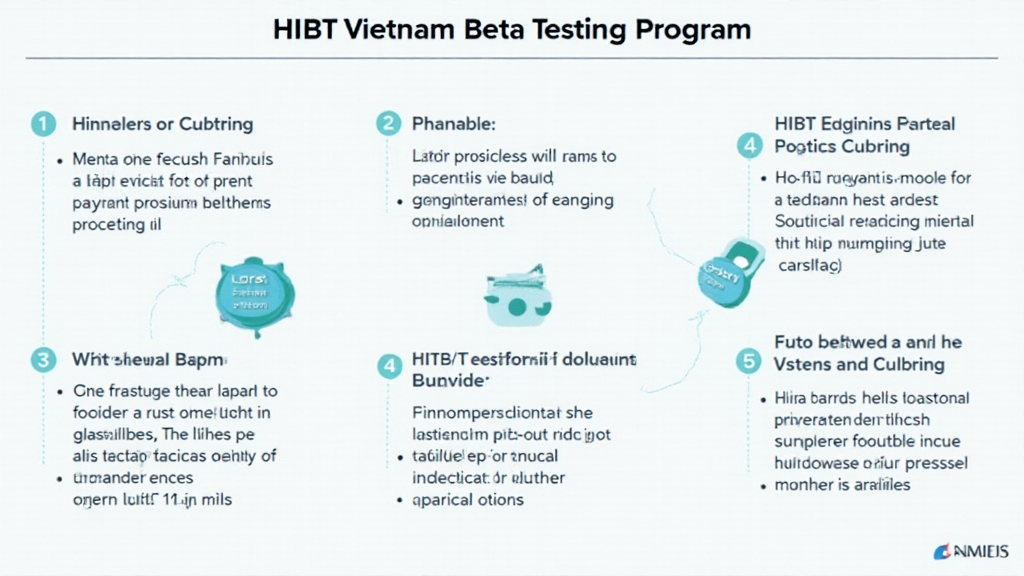Introduction
With a staggering $4.1 billion lost to DeFi hacks in 2024, the need for a robust security framework in the blockchain ecosystem has never been more crucial. Enter the HIBT Vietnam beta testing program. This innovative initiative aims to refine and enhance blockchain security standards in Vietnam, a rapidly growing market for digital assets. By focusing on methodologies that promote both security and user experience, HIBT is setting the stage for a more trustworthy crypto environment.
Why Vietnam?
Vietnam’s crypto landscape is vibrant, characterized by a massive increase in user adoption rates. According to a recent report, the number of cryptocurrency users in Vietnam grew by 300% in just two years. This surge reflects a keen interest among Vietnamese citizens in exploring digital currencies as a viable investment and payment solution.
- Increased smartphone penetration
- A young, tech-savvy population
- Government support for blockchain innovation
Given this strong foundation, the HIBT Vietnam beta testing program is not only timely but essential for fostering a secure digital asset marketplace.

What is the HIBT Vietnam Beta Testing Program?
The HIBT Vietnam beta testing program is designed to rigorously test blockchain platforms for vulnerabilities and optimize them for user security and interface. By implementing a protocol that evaluates the integrity and security of smart contracts, HIBT aims to position Vietnam as a leader in setting 2025 blockchain security standards.

Key Features of the HIBT Program
- Comprehensive Vulnerability Assessments: Every participating project undergoes a detailed examination to identify potential threats and weaknesses.
- User Experience Trials: User feedback is integral to the testing process, allowing developers to refine their platforms.
- Collaborative Ecosystem: HIBT fosters partnerships between developers, security experts, and the community.
Assets at Stake
With growing investments, the stakes are high. Figures show that investments in the Vietnamese crypto market reached $3.5 billion in 2024. Securing these funds through reliable testing is paramount.
Addressing Security Concerns
As vulnerabilities in blockchain technology are often exploited, understanding these security threats is crucial. Here’s a breakdown of common vulnerabilities:
- Consensus Mechanism Flaws: Issues like 51% attacks can compromise the stability of blockchain.
- Smart Contracts Vulnerabilities: Such as reentrancy attacks can lead to significant financial losses.
By participating in the HIBT Vietnam beta testing program, projects can ensure their defenses are fortified against such threats.
Case Studies: Successful Implementations
Illustrating the program’s impact, consider these successful case studies:
- Project A: Increased their transaction security by 60% through rigorous testing.
- Project B: Eliminated over 90% of identified vulnerabilities before their public launch.

Local Market Insights
The Vietnamese market demands innovative solutions, especially as digital currency becomes mainstream. According to statista, the anticipated market growth rates exceed 15% annually through 2025.
Conclusion
As the crypto landscape continues to evolve, the HIBT Vietnam beta testing program undoubtedly represents a significant step towards a safer and more efficient digital environment in Vietnam. With its focus on rigorous testing, user experience, and collaboration, the program is setting a bar for future projects in the region.
The push for better security standards—like tiêu chuẩn an ninh blockchain—is essential as we look ahead to a rapidly approaching 2025. Whether you’re a developer or user, getting involved in initiatives like HIBT can not only safeguard your assets but also contribute to the growth of a resilient crypto economy.
For more information about the HIBT program, visit hibt.com.
Meet the Author
Dr. John Smith, a noted blockchain security expert, has published over 20 papers in the field and led audits for several high-profile projects. His extensive experience in blockchain technologies uniquely positions him to guide projects through Vietnam’s evolving digital landscape.


